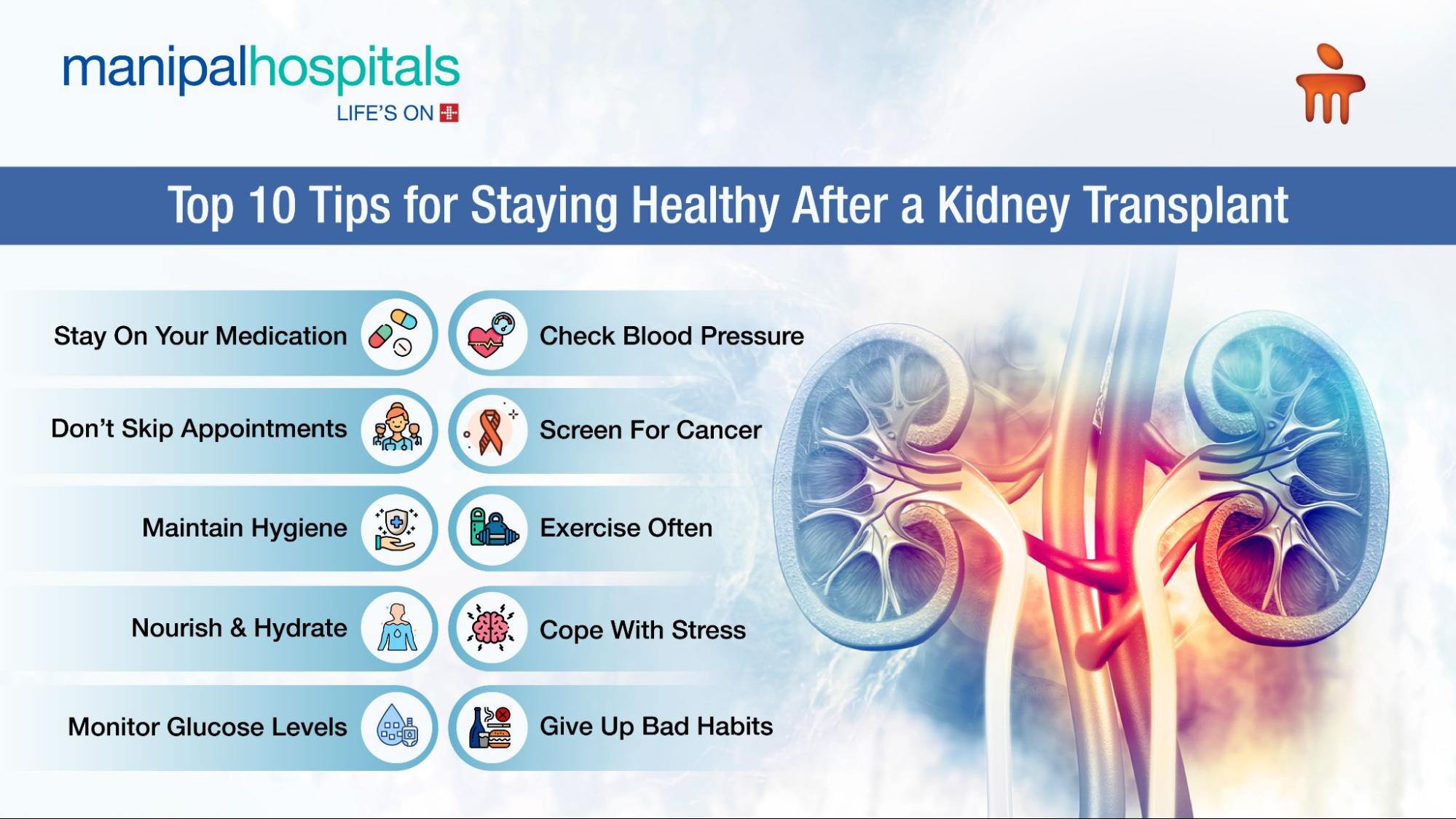Undergoing a Kidney Transplant can provide you with a new lease on life, but it does not always mean that the work is done. Chronic transplant rejection or other complications can develop months or years after Kidney Transplantation. Up to one-third of patients receiving cadaveric kidney transplants may experience graft loss within 5 years.1 Maintaining your health post-kidney transplant requires ongoing care and attention to manage or prevent these long-term complications. This blog post guides you on essential tips to improve your life after a kidney transplant.
Synopsis
Are Kidney Transplants A Complex Surgical Procedure?
Yes, Kidney transplants are complex surgical interventions that involve replacing diseased kidneys with healthy ones obtained from living or deceased donors. Typically, patients with end-stage renal disease are advised to undergo kidney transplantation. Due to the procedure's complexity, the patients take several months to recover, during which the transplant team closely monitors the patients to avoid organ rejection.
Top 10 Tips for Staying Healthy After a Kidney Transplant

Paying close attention to your transplant team's instructions can prevent any complications and ensure a successful recovery.
1. Stay On Your Medication
After a Kidney Transplant, you must take your prescribed complex medical regimen promptly. Anti-rejection medications are advised to reduce the chances of organ rejection, which you will have to take at the same time every day to ensure stable medication levels are maintained. The immunosuppressant medications may have to be taken for a lifetime. Avoid skipping or stopping these medications without your doctor’s approval.
2. Don’t Skip Appointments
Routine medical check-ups help diagnose transplant complications early. Also, you will have to undergo routine lab work to assess how well your kidney transplant is functioning and detect early signs of organ rejection. Additionally, it also helps analyse medication levels to ensure they remain stable. Other diagnostic tests may also be a part of these routine check-ups.
3. Maintain Hygiene
Kidney transplant patients' immunosuppressive medications reduce their body's ability to fight infections. Therefore, following good hygiene practices is crucial for mitigating the risk of infection post-procedure. You can start by washing your hands frequently, avoiding close contact with sick individuals, maintaining a clean environment, and staying up-to-date with vaccinations.
4. Nourish & Hydrate
Maintaining a healthy diet is crucial for the optimal functioning of your new kidney. After the transplant, even though dietary restrictions are minimal, the transplant team recommends a diet low in fat and sodium. Consuming fruits, vegetables, lean proteins, and whole grains while curbing the intake of unhealthy food (processed food and sugar) can also improve kidney health. It is also essential to stay well-hydrated after a kidney transplant.
5. Monitor Glucose Levels
Since steroids and anti-rejection medications are prescribed after Kidney Transplantation, they elevate your blood glucose levels, increasing your risk of developing post-transplant diabetes mellitus. Therefore, monitoring blood glucose levels and taking oral medications and insulin when necessary help maintain optimal blood glucose levels and prevent damage to transplanted organs.
6. Check Blood Pressure
High blood pressure can be detrimental to your renal health, including your new kidneys. Therefore, monitor your blood pressure regularly and follow your doctor's instructions to control it. These may include dietary changes, exercising, or taking medications.
7. Screen For Cancer
Recipients of organ transplants are at heightened risk of developing cancer due to anti-rejection medication. Therefore, based on your age and medical history, you will need to undergo prostate and skin cancer screening, colonoscopies, and mammograms.
8. Exercise Often
Exercise regularly to improve your physical health, lower blood pressure, increase energy levels, and improve sleep. It may also improve your heart and circulatory system. Your healthcare provider may recommend starting with a low or moderate-impact exercising option, such as walking, swimming, or cycling, for at least 150 minutes per week. Always consider consulting your healthcare provider before starting any new exercise regimen to ensure it’s safe for you.
9. Cope With Stress
Excessive stress can adversely impact the functioning of your new kidneys. Engaging in yoga and meditation may help you cope with stress. If you still find it difficult, talk to your healthcare provider.
10. Give Up Bad Habits
Alcohol and smoking are bad for your overall health as well as your kidney health. Alcohol is known to adversely affect medications and liver health while smoking worsens cardiovascular health. Steering clear of these habits can prevent long-term complications following a Kidney Transplant.
Recovery from a Kidney Transplant procedure can be taxing, so seek support from your family or medical professionals when necessary.
Conclusions
Staying healthy after a Kidney Transplant demands a commitment to a healthy lifestyle and continuous monitoring. All kidney recipients need to follow the instructions provided by their care team properly. If you have any concerns or want to have successful treatment outcomes, visit Manipal Hospitals, Bhubaneswar, for guidance. Or get a consultation from our expert Nephrologist.
FAQ's
Yes, after undergoing a Kidney Transplant you can live longer and resume your previous lifestyle. Even studies indicate that individuals who undergo Kidney Transplants have a better quality of life and survival rate than those who are on Dialysis.
Yes, individuals can undergo Kidney Transplantation twice; however, their risk of developing infection and a certain type of cancer increases significantly.
Individuals with complications following Kidney Transplantation exhibit symptoms such as fever, pain, swelling, changes in urination, and sudden weight gain. If you develop any of these symptoms, contact your healthcare provider immediately.
Since patients who receive Kidney Transplants take immunosuppressive medications, their bodies are less equipped to fight travel-related infections such as diarrhoea, respiratory infections, skin, and other infections. Therefore, you may have to take adequate pre-travel vaccinations.
You can schedule an appointment at Manipal Hospitals, Bhubaneswar, by contacting us or visiting our website.
Visit: https://www.manipalhospitals.com/bhubaneswar/specialities/nephrology/kidney-transplantation/
Contact no: 0674 666 6600



















 6 Min Read
6 Min Read











.png)




